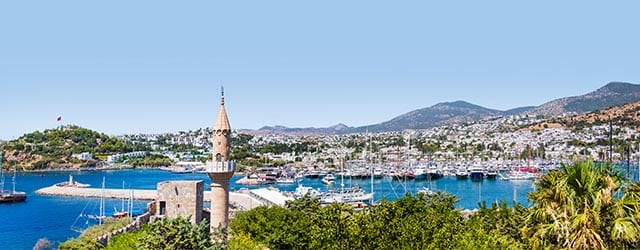Few places on Turkey’s coasts have managed development quite as well as the former ancient Greek port city of Halicarnassus, today Bodrum.

Millions of lire have been invested in this upmarket resort and peninsular in hotels, restaurants and marinas, yet the area has lost neither its dignity nor its sense of history. Though flashy places have opened, including the Jumeirah Bodrum Palace, the Dubai hotel group’s second Turkish property, the focus has been on the discerning tourist. The discretely luxurious Amanruya hotel, located in a former olive grove, where rooms can go for €1,700 per night ($1,940 in high season) and the bustling and cosmopolitan Mandarin Oriental, overlooking its own beach, are typical recent developments.
Yet the fear is that many of these venues—along with the luxury restaurants, upscale shops and mooring berths at the superyacht marinas in nearby Göltürkbükü and Palmarina, which cater to the international superrich—will remain largely empty this year as visitors stay away.
The deadly bomb attacks in Istanbul’s Sultanahmet Square and Istiklal Avenue and Ankara’s Kizilay Square, combined with the resurgence in violence in southeastern Turkey between the Turkish Army and the PKK, have severely dented confidence in Turkey’s all-important tourism industry. Blowback from the war in neighboring Syria, the depressing images of Syrian and Afghan refugees coming ashore on Turkish beaches and Russia’s economic boycott, have all reinforced the trend. In a typical year, the sector accounts for some 15% of GDP and is a crucial earner of foreign exchange, but last year earnings and visitor numbers were well down—early figures suggest 12% to 15%—and revenue this year could see a 25% drop, costing Turkey some $8 billion in valuable foreign revenue and worsening the current-account deficit.
In a statement to parliament in early April, Mahir Ünal, minister for Culture and Tourism, said that although visitor numbers dropped 10% in February—the biggest monthly drop in a decade—the sector was showing resilience.
“The reservations for this year have been slow, as people are cautious. We believe they will rebound again by the end of April,” he said.
Others are not so sure.
“The suicide attacks in particular have severely damaged the outlook for this year, and I don’t see things changing anytime soon,” says Fadi Hakura, Turkey expert at London’s Chatham House.
“The negative impact on tourism will deepen as of May,” predicts Bulent Sengonul, head of research at Investment in Istanbul, who says the spillover effects will dampen GDP growth.
Conference and incentives bookings are well down, while Antalya—a key resort for Russian tourists—is reporting a 40% slump in bookings. Some suggest numbers for the year could drop by as much as six million. The worry is that with Daesh (ISIL) only now beginning to seriously target Turkey, another wave of attacks could precipitate a more dramatic decline. In April, Australia and New Zealand warned citizens against nonessential travel to Istanbul and Ankara, and more warnings may follow. Most Western embassies advise extreme caution and the avoidance of crowded areas.
So what can Turkey do?
One of its secret weapons is Turkish Airlines, which flies to more destinations than any other airline in the world. This includes seven in Ukraine, and officials are hopeful that this year some one million Ukrainians will visit, up from last year’s 700,000, going some way to make up for the loss of Russian visitors. Another focus is medical tourism, for which Turkey is already one of the most visited destinations in the world, with a marketing push to potential customers in the Middle East, Central Asia and the Caucasus. The hope is to boost health tourism earnings to $5 billion in the next two years and up to $20 billion by 2023.



